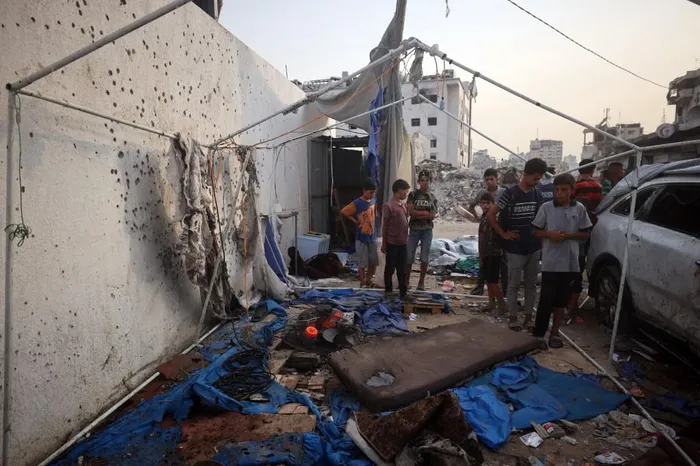What you need to know about Israel's plan to take over Gaza City

Palestinians check the destroyed Al Jazeera tent at Al-Shifa Hospital in Gaza City, Palestine, on August 11, 2025, following an overnight strike by the Israeli military.
Image: Majdi Fathi / NurPhoto / NurPhoto via AFP
Israel's security cabinet has approved a plan to take full control of Gaza City, marking an escalation in its almost two-year onslaught on Gaza.
The move has drawn condemnation from world leaders, international bodies, and even opposition within Israel itself.
The plan, approved last Friday, specifies that the Israel Defence Forces (IDF) will "prepare for taking control of Gaza city". This move comes as the death toll climbs, journalists are killed in targeted attacks, and hundreds of thousands of Palestinians in Gaza City starve due to Israel's blockade and ongoing attacks.
A statement from the Israeli prime minister's office outlined five "principles" for ending the war, which this takeover is presumably intended to support. This is what the takeover plan entails.
- The disarmament of Hamas
- The return of all hostages, both living and dead.
- The demilitarisation of the Gaza Strip.
- Israeli security control over the Gaza Strip.
- The establishment of an alternative civilian administration that is neither Hamas nor the Palestinian Authority.
The IDF has also stated that it will provide humanitarian aid to the "civilian population outside the combat zones." However, it remains unclear whether this will be new aid or delivered via existing mechanisms.
It's worth noting that Israeli Prime Minister Benjamin Netanyahu had previously indicated a desire for Israel to control the entire Gaza Strip.
However, the newly approved plan specifically mentions only Gaza City.
Reports in Israeli media suggest this narrowing of scope comes after heated debate with the army's chief of staff, who reportedly voiced strong opposition to a full takeover of Gaza.
Despite this, some speculate that control over Gaza City could be the first phase of a full-scale takeover of the entire Gaza Strip. There is also speculation that the threat of full occupation could be a strategy to pressure Hamas into concessions in stalled ceasefire negotiations.
Netanyahu has told Fox News that Israel does "not want to keep" Gaza and eventually intends to hand it over to "Arab forces," aiming for a "security perimeter" without governing the territory.
However, the BBC's chief international correspondent notes that Netanyahu has been "intentionally vague" about which "Arab forces" he refers to, with countries like Jordan and Egypt willing to cooperate but not "on the back of an Israeli occupation".
No specific timeline has been provided for when the takeover will commence, though reports suggest the military will not move into Gaza City immediately, and residents will first need to evacuate.
Furious reactions and global condemnation:
The plan has been met with fierce opposition and strong warnings.
Hamas has slammed the plan as a "new war crime," warning that this "criminal adventure will cost it dearly and will not be an easy journey". The group also stated that the decision confirms Netanyahu and his "Nazi government do not care about the fate of their captives," asserting that "expanding the aggression means sacrificing them". Hamas has also warned of "fierce resistance" to the move.*
World leaders have also condemned the plan. UK Prime Minister Sir Keir Starmer called Israel's escalation "wrong," stating it "will only bring more bloodshed".
Germany's Chancellor Friedrich Merz announced that his government would not approve further exports of military equipment to Israel for use in Gaza, finding it "increasingly difficult to understand" how the plan aligns with legitimate aims.
The UN's human rights chief, Volker Türk, warned that further escalation "will result in more massive forced displacement, more killing, more unbearable suffering, senseless destruction and atrocity crimes, urging for the war in Gaza to "end now".
Palestinian President Mahmoud Abbas described the move as a "fully-fledged crime," while Turkey's foreign ministry stated that Israel aims to "forcibly displace Palestinians from their own land".
The United States has been less critical, with President Donald Trump saying it was "pretty much up to Israel" whether to fully occupy Gaza, and US Ambassador to Israel Mike Huckabee stating, "It's not our job to tell them what they should or should not do".
IOL